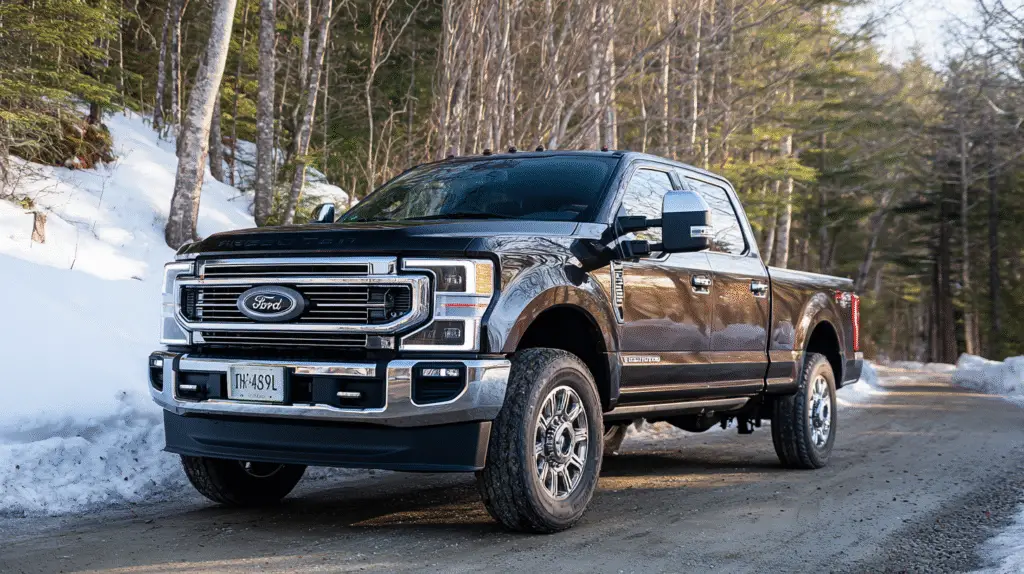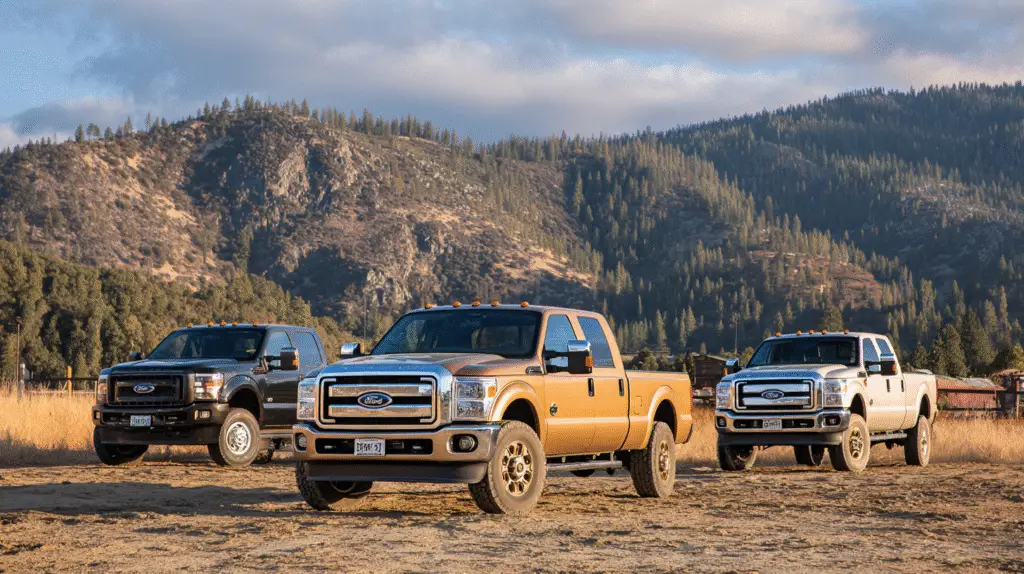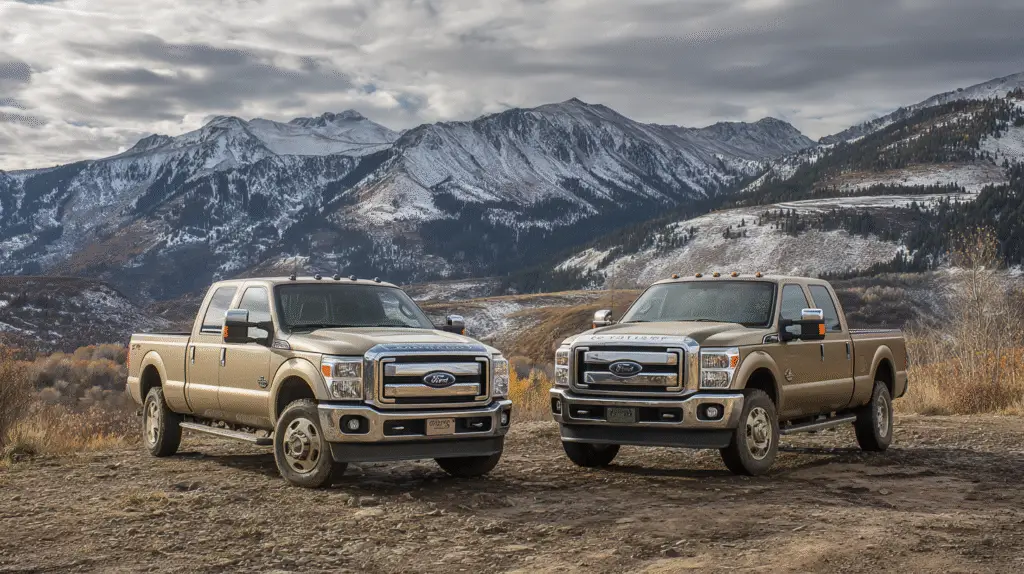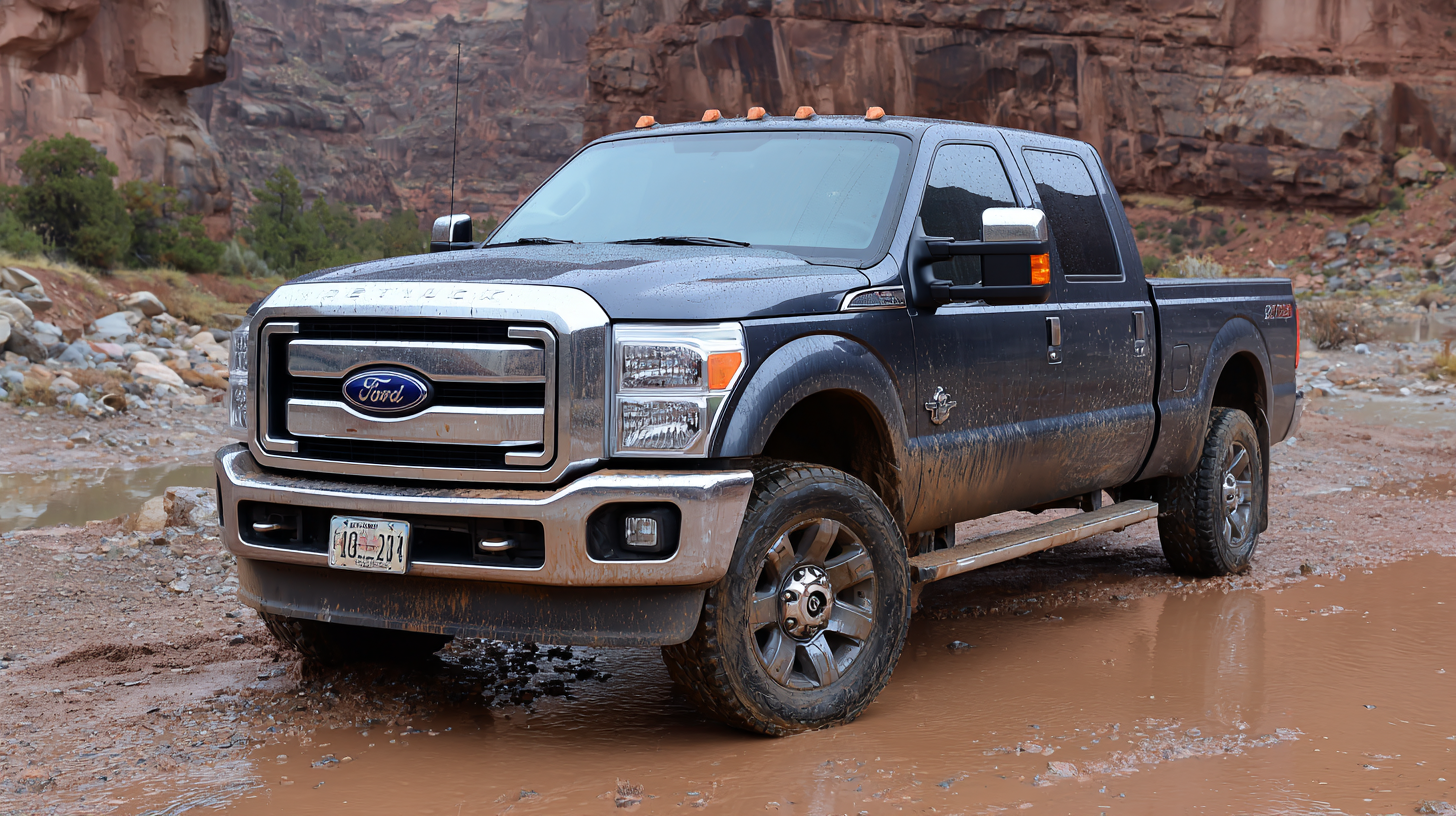In the world of pickup trucks, understanding classifications like “half-ton” and “one-ton” can feel like decoding a secret language. It’s a topic that’s as intriguing as it is essential for truck enthusiasts and potential buyers. That’s why we’re diving into the often asked question: Is an F350 a one-ton truck? This query might seem straightforward, but it opens up a fascinating discussion about truck classifications, capabilities, and how they align with your needs.
The significance of getting to the bottom of this question cannot be overstated. Whether you’re hauling heavy loads, embarking on adventurous off-road journeys, or simply seeking the right truck that matches your lifestyle, knowing the ins and outs of your vehicle’s classification is key. So, let’s embark on this exploratory journey together, shedding light on the mysteries of truck tonnage and discovering just where the F350 fits in the grand scheme of things.
Key Takeaways
- The F350 exceeds traditional one-ton classification with its superior payload and towing capacities, reflecting advancements in automotive design and engineering.
- Modern truck classifications, including the F350’s, are based on more than just payload capacity; they also consider the vehicle’s construction, engine power, and robust suspension systems, making the F350 ideal for demanding hauling and towing tasks.
- Despite its evolution and capability exceeding the traditional one-ton category, the F350 is often still colloquially grouped under the “one-ton” truck category due to its role in the heavy-duty truck market and its historical classification roots.
- The F350 stands out among one-ton trucks for its performance, size, towing capacity, and advanced safety and comfort features, making it a top choice for both personal and professional heavy-duty use.
- Understanding the tonnage classification, like that of the F350, is crucial for buyers and business owners for making informed decisions, as it directly impacts the truck’s functionality, usage, and potential for increasing operational efficiency.
- Beyond payload and towing capacities, the F350 offers advanced safety technologies, comfort, and connectivity options, enhancing its value and appeal to a wide range of users, from truck enthusiasts to professionals.
Understanding Truck Classification

Diving deeper into the world of trucks, it’s essential for us to grasp how truck classification works. This knowledge not only satisfies curiosity but also aids in making informed decisions when it comes to choosing the right truck for our needs.
What Makes a Truck a “1 Ton”
When we talk about a “1 ton” truck, we’re essentially referring to a classification that originates from the truck’s payload capacity. Traditionally, a “1 ton” designation meant the truck could carry 2,000 pounds of payload in its cargo area, including the weight of passengers and cargo itself. However, it’s important to note, vehicles today, especially models like the F350, often exceed these traditional payload capacities significantly.
In exploring whether an F350 is a “1 ton,” it’s crucial to understand that modern classifications have evolved. The F350, part of Ford’s Super Duty series, actually falls into a higher class due to its ability to handle much more than just 2,000 pounds of payload. This evolution in classification reflects advancements in automotive design and engineering, allowing trucks to carry more without compromising performance or safety.
Key Differences Between Truck Classes
Truck classes are distinguished by their payload capacities, which is the core difference between them. The spectrum ranges from the “half-ton” pickups, which were traditionally rated to carry up to 1,000 pounds, to the “three-quarter-ton” and the “one-ton” trucks, known for 1,500 and 2,000 pounds capacities respectively. However, with modern advancements, these numbers have become more symbolic than literal.
The key differences also lie in the construction and purpose of these trucks. For instance, “half-ton” trucks like the F150 are designed for versatility, balancing everyday usability with decent hauling capabilities. On the other hand, trucks classified beyond the “one-ton,” such as the aforementioned F350, are built with heavier frames, more powerful engines, and more robust suspension systems to accommodate higher payloads and towing capacities. This makes them ideal for more demanding tasks, confirming that an F350 exceeds the traditional “1 ton” classification in both capability and design.
Understanding these distinctions helps us see why an F350 is considered more robust and capable than what the term “1 ton” might traditionally imply, emphasizing the need to look beyond historical classifications when evaluating trucks’ capabilities today.
Unpacking the F350’s Classification

Exploring the F350’s classification helps us appreciate its capabilities and how it fits within the truck spectrum. Let’s dive into its history and current category placement.
The History and Evolution of the F350
The roots of the Ford F350 trace back to an era when trucks were primarily assessed by their payload capacities, correlating directly to their classification. Initially, classifications such as “half-ton” and “one-ton” served as general guides for buyers to gauge a truck’s carrying capability. Over the years, advancements in automotive engineering and design have significantly improved the payload and towing capacities of trucks. This evolution has blurred the traditional lines of truck classifications.
The Ford F350, in particular, has been a testament to this progress. Introduced as part of Ford’s F-Series, it was designed to meet the higher demands of hauling and towing that exceeded the capacities of its lighter counterparts. As materials became stronger and engine technologies advanced, the F350’s payload and towing capabilities grew, setting new benchmarks for what trucks could handle. Such improvements have allowed the F350 to carry and tow much more than the archetypical “one-ton” designation would suggest, making it a powerhouse in the heavy-duty truck segment.
How the F350 Fits into the 1 Ton Category
Answering “is a F350 a 1 ton?” requires looking beyond the historical connotations of “one-ton” as a measure of payload capacity. Traditionally, a one-ton truck could carry 2,000 pounds of payload. However, modern trucks, including the F350, far exceed these numbers, thanks to beefier frames, more robust drivetrains, and advanced suspension systems. For instance, the F350, with its superior engineering, often boasts a payload capacity that dwarfs its one-ton classification, firmly placing it in the heavy-duty category alongside other vehicles designed for the most demanding towing and hauling tasks.
Yet, despite outperforming the nominal one-ton payload capacity, the F350 and similar trucks are often still colloquially grouped under the “one-ton” category. This classification is more about their broader role in the heavy-duty truck market than about their specific payload limit. The F350’s blend of capability, durability, and power makes it a standout in its class, offering a level of performance that meets and exceeds the needs of most heavy-duty users.
While the Ford F350 surpasses the traditional capacity associated with one-ton trucks, it remains a benchmark in the heavy-duty category. Its evolution from a simple work truck to a modern hauler encapsulates the progress of truck design and capability, highlighting why such classifications are more nuanced today.
Comparing the F350 to Other 1 Ton Trucks

When it comes to heavy-duty trucks, the F350 often sparks the question, “Is a F350 a 1 ton?” Given its impressive capabilities and features, let’s dive into how it stacks up against other trucks in its class.
Performance and Capability
The F350 is a powerhouse, designed for heavy lifting and high performance. Boasting a robust engine lineup, including options for both diesel and gasoline powertrains, this truck doesn’t shy away from tough jobs. Its top-of-the-line diesel engine delivers impressive horsepower and torque, enabling exceptional hauling capabilities that often surpass those of its 1-ton counterparts.
In comparison, other 1-ton trucks on the market offer similar diesel and gasoline options. However, the F350 stands out with its high-strength steel frame and advanced towing technologies, ensuring that it can handle payloads and towing tasks more efficiently than many competitors. This makes the F350 a top choice for those who need a truck that’s as reliable on a construction site as it is on a long haul.
Size and Towing Capacity
Size-wise, the F350 has a commanding presence, with dimensions that ensure stability and space for cargo and crew alike. Its design emphasizes both functionality and comfort, with a spacious interior that accommodates passengers comfortably during long drives.
Towing capacity is where the F350 truly shines. It’s engineered to tow heavy trailers, boats, and more, with ease. Thanks to its integrated trailer brake controller, trailer sway control, and tow/haul mode, the F350 enhances towing safety and performance, making it a trusted partner for any towing needs.
While other 1-ton trucks offer ample towing capacities, the F350’s towing features and technologies provide a level of control and confidence that is hard to match. Whether it’s towing equipment for work or a camper for a weekend getaway, the F350 ensures that heavy loads are transported safely and efficiently.
When compared to other 1-ton trucks, the F350 not only meets the mark but often exceeds expectations in performance, capability, size, and towing capacity. It’s a robust vehicle designed for those who demand excellence and reliability from their heavy-duty truck.
The Significance of Truck Tonnage
Understanding truck tonnage, such as whether the F350 is indeed a one-ton truck, plays a crucial role in appreciating what these vehicles can handle and how they’re categorized in the market.
Impact on Usage and Functionality
The tonnage classification of a truck, such as the F350, directly impacts its intended usage and functionality. Initially, the “one-ton” label served as a guide for payload capacity, indicating that these trucks could carry 2000 pounds in their cargo bed. However, advancements in automotive engineering have pushed these capacities much higher. The F350, despite being historically grouped as a one-ton truck, now surpasses this traditional payload capacity, offering a robust platform for carrying heavy loads and performing demanding tasks. This evolution in capability means that we can count on the F350 for more significant hauling and towing jobs, from construction materials on job sites to large trailers for cross-country moves, reflecting its versatility and heightened performance.
Importance for Buyers and Business Owners
For buyers and business owners, understanding the tonnage classification, especially in trucks like the F350, is vital for several reasons. First, it helps in making an informed purchasing decision. Knowing that the F350 surpasses the traditional one-ton payload capacity ensures that buyers are selecting a vehicle that meets their specific hauling and towing needs. Second, for businesses that rely on heavy-duty trucks, the enhanced capabilities of the F350 translate to increased efficiency and potential for higher revenue. The ability to transport larger loads in a single trip can save time and operational costs, making the F350 an invaluable asset for enterprises from logistics companies to construction contractors. Consequently, the tonnage classification is more than just a number; it’s a critical factor that influences the economic and practical aspects of purchasing decisions.
Beyond Tonnage: Other Essential F350 Features
While we’ve delved deep into the F350’s classification and its evolution beyond the traditional one-ton payload capacity, it’s crucial to recognize that there’s much more to this power-packed truck than meets the eye. Let’s explore some of the other essential features that make the F350 a standout choice for truck enthusiasts and professionals alike.
Advanced Safety Technologies
In our journey to understand what makes the F350 a remarkable vehicle, we can’t overlook the cutting-edge safety features that come with it. Modern F350 models are equipped with a suite of advanced safety technologies designed to protect you on your travels. First up, there’s the Adaptive Cruise Control system, which automatically adjusts your speed to maintain a safe distance from the vehicle in front of you, making long drives less taxing and safer.
Then, there’s the Blind Spot Information System (BLIS) with Trailer Coverage. This nifty feature alerts you if there’s a vehicle in your blind spot or alongside your trailer while you’re merging or changing lanes, significantly reducing the risks associated with towing. Add in the Pre-Collision Assist with Automatic Emergency Braking, which can detect potential collisions and automatically apply the brakes to avoid accidents, and you’ve got a truck that’s not only powerful but also built to keep you safe on the road.
Comfort and Connectivity Options
Moving beyond safety, the F350’s comfort and connectivity options truly set it apart from the crowd. The interior is designed with long hauls and tough jobs in mind, offering features like leather seating, dual-zone automatic climate control, and heated and ventilated seats to ensure you stay comfortable, no matter where your work takes you.
On the connectivity front, the F350 doesn’t disappoint. With the SYNC 3 infotainment system, you’re treated to an intuitive interface with Apple CarPlay and Android Auto compatibility, allowing you to stay connected to your digital world with ease. There’s also an available Wi-Fi hotspot that supports up to 10 devices, ensuring you and your crew remain productive even when you’re on the move.
In essence, the F350 goes beyond just being tagged as a one-ton truck. With its advanced safety technologies, and a wide array of comfort and connectivity options, it’s designed to meet the needs of today’s drivers, offering a level of sophistication and capability that’s hard to match.
Conclusion
We’ve taken a deep dive into what makes the F350 stand out in the heavy-duty truck market. It’s clear that it’s not just about how much it can carry but also about how it ensures the safety and comfort of its passengers. The F350 has evolved to offer a blend of power, durability, and advanced features that cater to a wide range of needs. Whether it’s for tough work tasks or ensuring a safe and comfortable ride, this truck proves to be more than capable. It’s a testament to how far trucks have come and what they offer to today’s drivers.
